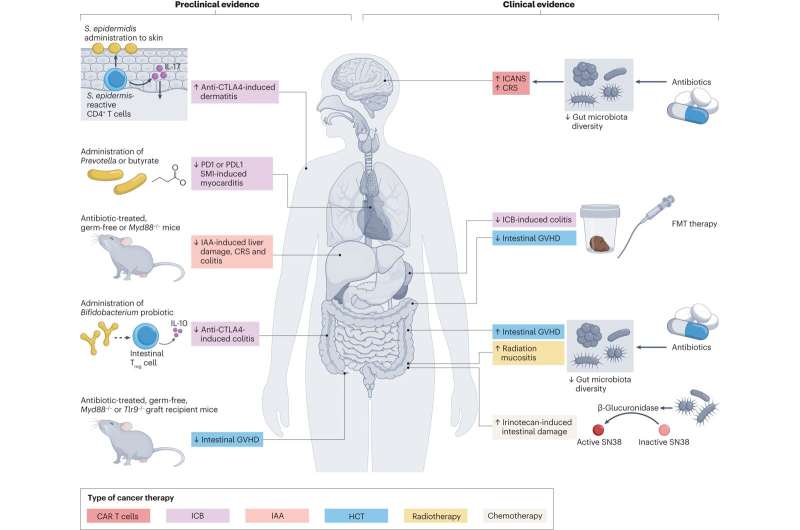This article has been reviewed according to Science X's editorial process and policies. Editors have highlighted the following attributes while ensuring the content's credibility:
fact-checked
peer-reviewed publication
trusted source
proofread
Researchers confirm role of gut microbes in cancer therapy

Medical researchers have confirmed the role of a complex community of gut organisms in the effectiveness of cancer treatments and in reducing toxicity.
The comprehensive review of evidence from more than 200 publications was conducted by SAHMRI and Flinders University research led by Professor David Lynn and Dr. Stephen Blake.
The study, with colleagues from Tel Aviv University and Sheba Medical Center in Israel, was published in the journal Nature Reviews Immunology.
Of the hundreds of studies analyzed, many demonstrated the intricate mechanisms by which specific microbes can alter the behavior of our immune system and make the environment inside tumors more or less favorable for the body to attack cancer cells.
"The human gut is home to trillions of microbes that influence how our bodies respond to cancer treatments, especially immunotherapy," says Professor Lynn.
"This study highlights the potential of the gut microbiota to enhance cancer therapies. We've long suspected these microbes are crucial and now we have growing evidence to support that."
This field is rapidly advancing from the observational stage to early interventional clinical trials that have shown promising results, demonstrating microbiota interventions can make cancer treatments both more effective and less toxic to patients.
Various methods of manipulating the composition of gut microbes are currently under investigation, including Fecal Microbiota Transplantation (FMT), which involves transferring healthy gut microbes from one person to another; in addition to dietary changes, prebiotics and probiotics.
"We're optimistic about the potential of these approaches because we're not treating the cancer itself, we're optimizing the internal environment to enhance the body's own response to various cancer therapies," says co-author Dr. Blake.
He says cancer therapy isn't the only beneficiary of the boom in microbiota research. There's also huge potential to improve detection, with other research teams at SAHMRI investigating methods to engineer probiotic bacterial strains to be able to locate cancerous cells and deliver therapies directly to tumors.
"While there's plenty to be excited about, more research is needed to better understand the long-term health implications of altering gut microbes, especially for cancer survivors and we'll continue to collect and analyze this data," adds Dr. Blake.
Researchers are confident the groundswell of work in this field will pave the way for better overall outcomes in cancer, offering greater hope for patients in the future.
More information: Stephen J. Blake et al, Role of the microbiota in response to and recovery from cancer therapy, Nature Reviews Immunology (2023). DOI: 10.1038/s41577-023-00951-0




















